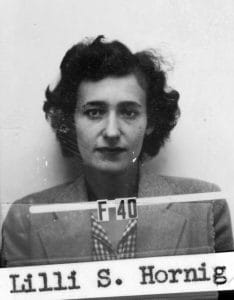Hornig and her family fled Nazi Germany and settled in the United States in 1933. She went to college, and got married. In about 1944, Hornig’s husband Donald, a chemist and explosives expert, was recruited for an important team for World War II: as a scientist on the Manhattan Project, which developed the atomic bomb. Lilli went along, and was offered a job too — as a secretary for the scientists. Mrs. Hornig didn’t know how to type, but she was an accomplished chemist herself, with a bachelor’s degree from Bryn Mawr and a master’s from Harvard. She was also hired as a staff scientist, where she worked on the trigger for the bomb. On its first test on 16 July 1945, she described the nuclear explosion as “boiling clouds and color — vivid colors like violet, purple, orange, yellow, red.” After seeing its power, she was among many scientists who signed a petition asking that the bomb be demonstrated on a deserted island, rather than used on a Japanese city, hoping Japanese leaders would understand its power and surrender. “But big boys like big toys,” she said years later. “I don’t think the Army even considered that request.” Japan did not, in fact, surrender after the first bomb was dropped on Hiroshima less than a month later. But after the second strike, on Nagasaki 3 days later, they did surrender, ending World War II; Germany had surrendered on 8 May 1945.

